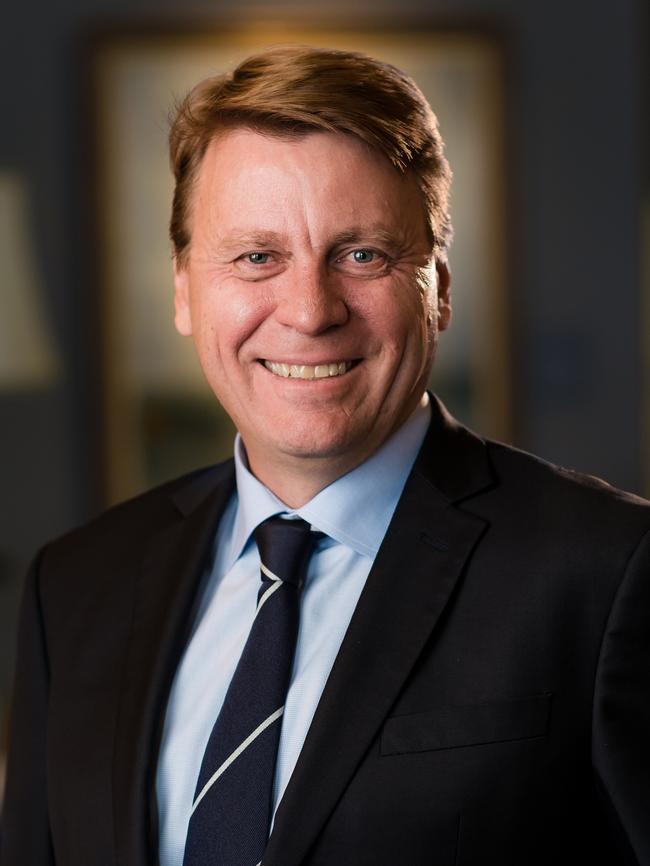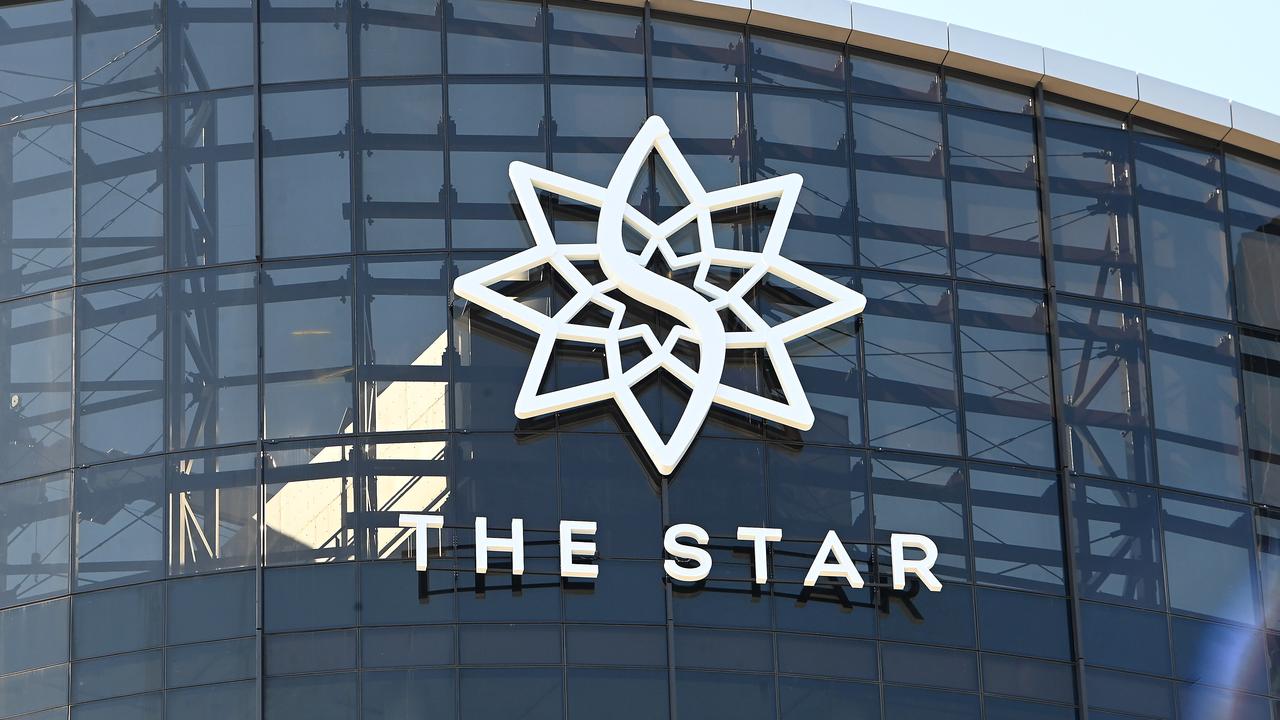Why Newcrest shines so bright for Newmont CEO Tom Palmer
The $24bn move on the Australian gold producer comes when it is most vulnerable.

Business
Don't miss out on the headlines from Business. Followed categories will be added to My News.
Australian mining runs deep in Tom Palmer, the boss of US gold giant Newmont.
Palmer was born in Broken Hill and studied engineering at Melbourne’s Monash University before being put on the management track over two decades with Rio Tinto.
Even while running the Denver-based gold multinational Palmer spends six months of the year living in Perth, close to its giant Boddington gold and copper mine. So the CEO knows the ridges and valleys of the local mining market and this has helped him to sharpen all the angles in his $24bn all-share approach for Newcrest.
Newmont is already the world’s biggest gold producer, but Palmer knows mining is all about scale and to stay ahead for investors is processing more ore and having a diverse spread of mines to keep output predictable.
The vision for Palmer is to create a $US55bn ($80bn) golden giant, which puts the company in the ranks of the top five miners in the world, making it hard to ignore for some global investors.

The move has been timed with Newcrest at its most strategically vulnerable. The miner recently parted ways with abrasive chief executive Sandeep Biswas and a search is underway for a replacement. Newcrest chief financial officer Sherry Duhe has stepped up as acting CEO, and as a former top Woodside executive has put her hat in the ring. Signs that global inflation is cooling will also help the perception that gold has entered a cyclical downswing.
Still the longer-term dynamics of gold look up. Global mine output remains flat, while demand is increasing from central banks looking to hold more gold. Australia’s Future Fund last year said it was starting to become a direct investor in gold as part of an investment diversification push. Recent figures from the World Gold Council show last year was the highest year for central bank buying for more than five decades.
Newcrest is Australia’s biggest stand-alone gold producer and the biggest gold miner in Canada’s lucrative British Columbia, and combined with the former Lihir operations in Papua New Guinea, Newmont can see a strong fit with its existing African and North and South American operations.
Investment peak
Newmont has made several informal approaches toward Newcrest previously although this is the first where the board led by Peter Tomsett is taking the indicative all-share offer seriously by starting to deliver compelling value and is weighing up options.
Even with the implied $26.07 offer price delivering a 21 per cent premium to Newcrest’s pre-bid close, investors will want to see more or a cash component before backing in a deal. Newcrest has increasing copper exposure, the metal that is becoming the hottest mineral of the renewable energy revolution.
Newcrest has ultra-long life assets with mines expected to continue to produce over decades, however the company also faces a capex- particularly over the next two to three years which could force it to borrow as it expands operations at Cadia and Red Chris in British Columbia. This investment hump is likely to squeeze Newcrest’s dividends, and this gives Palmer scope to talk up the US miner’s own record in being predictable with dividends.
Many of Newcrest’s investors are also holders of copper play OZ Minerals. An independent expert report is shortly due to be released over BHP’s $9.6bn friendly bid for OZ, a deal increasingly seen among investors as giving too much value away to suitor BHP.
Palmer was in Melbourne during the mid-1990s when Newcrest made its unsuccessful move on then Adelaide-based arch rival Normandy. This put in motion a series of events that years later saw Normandy eventually fall to Newmont, giving the US company a critical stake in Kalgoorlie's Super Pit. This holding was sold off by Palmer shortly after he took charge in 2019, but his hunger for Australian gold is bigger than ever.
–
Openpay’s collapse
At the top of last week buy now, pay later minnow Openpay was boasting of record revenue and customer numbers, and all the figures suggested profits were finally within reach.
Just five days later it was all over with the biggest shareholder, the private Tel Aviv and Melbourne-based Meydan family, pulling funding, triggering a chain of events leading to the collapse of the lender.
The mood between Tuesday’s quarterly update and Friday’s appointment of McGrath Nicol as Openpay’s receiver was stark but trouble had been brewing for weeks.
Openpay co-founder Yaniv Meydan pulled a multimillion-dollar funding line last Tuesday, choking off cash needed for day-to-day running expenses. Meydan only resigned from Openpay’s board on Friday, but was technically still a director as the company he founded was scrambling to find a new line of credit.
Without the funding commitment, Openpay was in breach of loan agreements with OP Fiduciary, which appointed McGrathNicol.
Openpay’s troubles are anchored firmly in the troubled buy now, pay later sector. The payments platforms thrive when cash is cheap and are able to use inflated shares to fund their lending book. But in a market where higher interest rates place a premium on cash the business model is severely challenged.

Openpay’s problems were complicated by the reliance of the founder to fund its growth. Having skin in the game is important, but at some point during its listed life Openpay needed to diversify its debt funding sources. Debt investors and equity investors pull in different directions and at some point the two are going to conflict. The Meydan family had a 28.4 per cent stake in Openpay and a $12m line of credit with the company. The terms of the credit facility and the withholding of payment is expected to come under the attention of receiver Barry Kogan of McGrathNicol. The Meydan Group family office was contacted for comment.
Openpay differentiated itself from other BNPL players by funding big ticket transactions up to $20,000 and offering more frequent repayment plans and often over two years. It specialised in healthcare – particularly dentists – as well as education and car repairs. McGrathNicol’s Kogan said an urgent assessment of the company was underway. “We will be working constructively with all stakeholders to secure the best possible outcome,” Kogan says.
A sale of the lending portfolio is likely, while the fintech arm OpyPro, which allows merchants to manage in-store and online transactions through a single platform. could generate interest. The platform was being trialled by supermarket giant Woolworths.
Cash burn
The company came at the tail end of the BNPL stockmarket listings, hitting the ASX in 2019. It took almost a year to trade above its $1.60 a share offer price, but eventually became swept up in the massive buy now, pay later wave. At its Openpay was valued at more than $600m. On Friday before its collapse it was a little over $45m.
Through the boom Openpay had global expansion ambitions, pushing into the UK and US markets and it also moved into New Zealand. This was unwound as funding markets became tough and the aim was to preserve cash.
Openpay’s most recent quarterly update showed it was burning through $18m of cash and had little more than three months left of funding before going back to lenders. Even so it was boosting sales and had expected to be earnings positive by June this year.
It had the support of lenders for a receivables funding facility of $110m, which Openpay said was more than enough headroom to support volumes required to reach profitability.
Optus’s Australian boss and former Commonwealth Bank executive Kelly Bayer Rosmarin was one of the foundation directors of Openpay, although she resigned in January last year.
Openpay’s chairman was former Pepper Group CEO Patrick Tuttle. Hong Kong’s Chow Tai Fook Enterprises had a 14.7 per cent stake.
johnstone@theaustralian.com.au
Originally published as Why Newcrest shines so bright for Newmont CEO Tom Palmer





